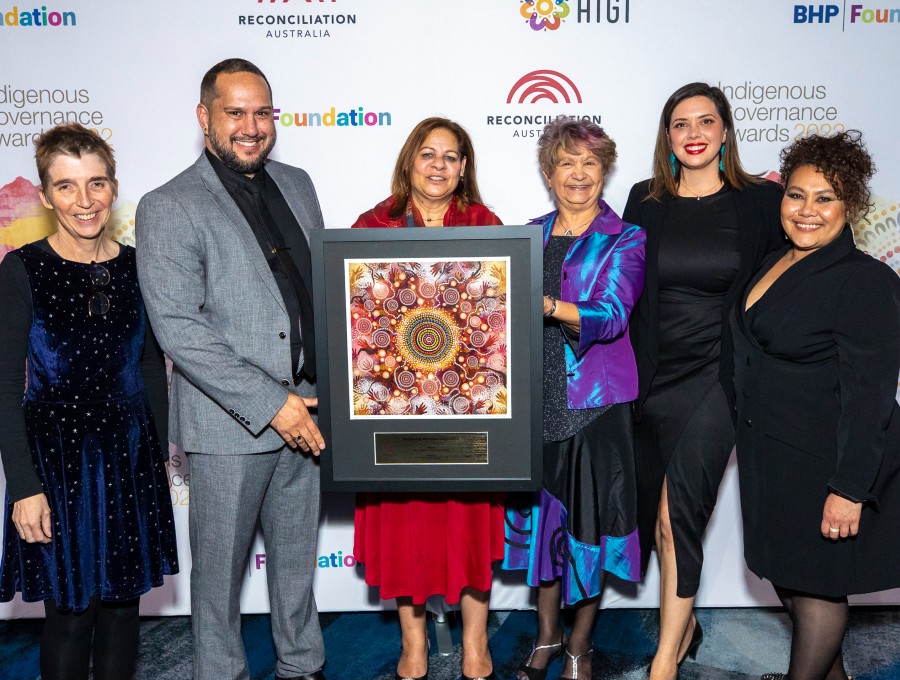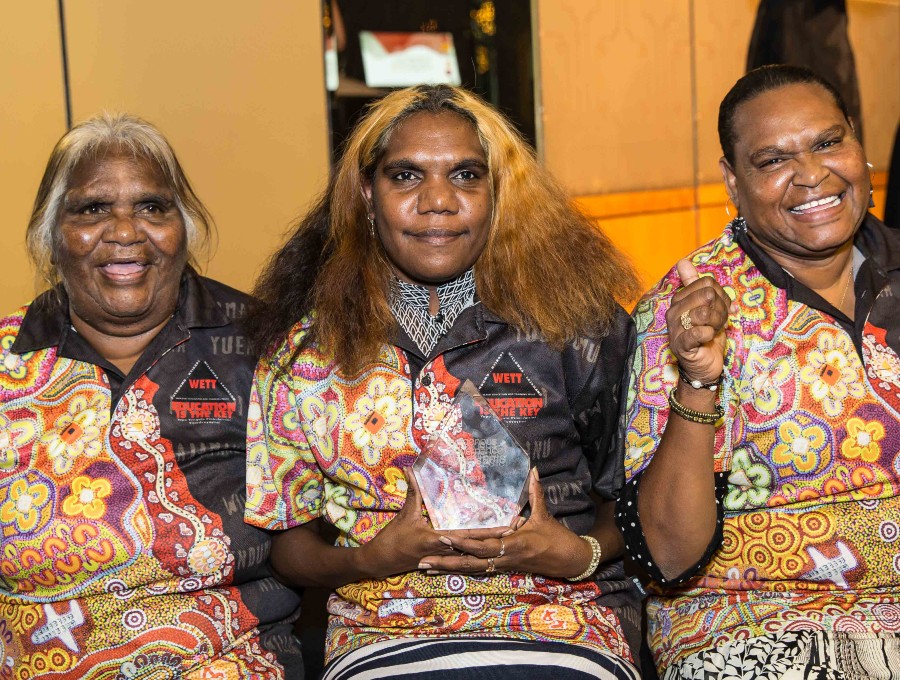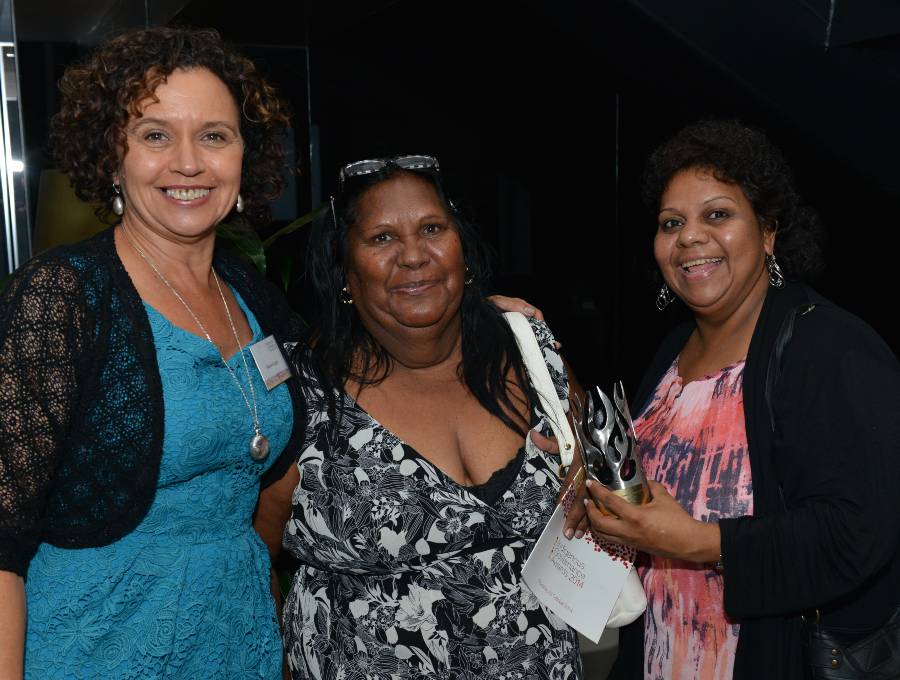Winner: Category A
Western Desert Nganampa Walytja Palyantjaku Tjutaku Aboriginal Corporation
Established by raising over $1 million in funding at the Art Gallery of New South Wales, Western Desert Nganampa Walytja Palyantjaku Tjutaku Aboriginal Corporation (Western Desert Dialysis) has grown into a trailblazing community controlled health organisation. Focused on providing dialysis treatment and support services to Indigenous renal patients from remote communities across Central Australia, the organisation’s name means ‘making all families well’ in the Pintupi Luritja language. Run by Aboriginal people for Aboriginal people, Western Desert Dialysis wraps traditional ways of caring and being around modern medicine.
The Western Desert Dialysis mission is to improve the lives of people with renal failure, reunite families and reduce the incidence of kidney disease in their communities. This is done through the provision of dialysis treatments at the ‘Purple House’ in Alice Springs and the travelling ‘Purple Truck’, which allows people to stay on Country to look after, and be looked after by, their families. By taking an holistic and culturally appropriate approach to healthcare, Western Desert Dialysis is contributing to stronger, healthier communities.
Winner: Category B
Murdi Paaki Regional Assembly
The Murdi Paaki Regional Assembly (Murdi Paaki) is the peak governance body for Aboriginal and Torres Strait Islander people in the west, north-west and far west of NSW. It is made up of representatives from 16 communities, as well as Murdi Paaki Aboriginal Young and Emerging Leaders, and NSW Aboriginal Land Council Councillors from across the region.
While considered to be an under-estimation, the Aboriginal population of the Murdi Paaki region at the 2011 Census was 18 per cent of the total population. As a result, effective Aboriginal and Torres Strait Islander representation in this region is crucial for service delivery, and Murdi Paaki is the peak body which engages with government and agencies at all levels. Murdi Paaki’s major role is facilitating a more strategic emphasis on engagement, responsiveness, co-ordination and accountability from government and non-government agencies.
The story of Murdi Paaki is a story of sovereign rights, which lie at the heart of the initiative. The Murdi Paaki charter of governance expresses ‘resolve to manage our own affairs, build sustainable communities and determine our own future’. Murdi Paaki promotes the practices of good governance, responsible leadership and empowerment, which together are driving change in regional NSW.
Finalists: Category A
Kanyirninpa Jukurrpa
Highly Commended
Based in Newman, Western Australia, Kanyirninpa Jukurrpa (KJ) was established to help the Martu people look after their culture and heritage and ensure Martu’s connection with Country remains strong. KJ works to protect the health and wellbeing of the land under the Martu native title determination, which spans three deserts and 13.6 million hectares. Initiatives operated by KJ include an extensive ranger program running in five communities, a leadership program, a return to Country program and cultural knowledge management.
Together, these programs have generated social, cultural and economic transformation across the Martu communities, and KJ is now the single biggest employer of Martu. One of the less tangible, but equally important, successes of KJ’s work has been the reinstatement of cultural authority to the Martu Elders. The Elders now have increased confidence in their ability to shape their future and have responded positively to the commitment of younger Martu to learn and fulfil their cultural obligations. KJ sees culture as the wellspring of identity, confidence and strength. This is true for both communities and individuals. With this belief at the core, KJ is building an economic base that empowers Martu to make their own decisions about their communities’ futures
Mallee District Aboriginal Services
Mallee District Aboriginal Services (MDAS) operates out of Mildura, Swan Hill, Kerang and Robinvale and was established to service the diverse needs of Aboriginal communities along the Murray River in Victoria and New South Wales. By providing “cradle to the grave” services in the areas of health, family, housing, aged care, substance abuse, training, community development, emotional and social well-being, rehabilitation and justice, MDAS is bringing about generational change. MDAS recognises the benefit to health and well-being of reconnecting the community with culture and building pride in local Aboriginal heritage. As a result, MDAS is pioneering a community-controlled approach to Aboriginal health services and supporting improved life outcomes within their communities.
MDAS’s commitment to developing systems and structures informed by evidence-based data is enabling the organisation to improve community health and well-being outcomes. This rigorous approach to decision-making and strategic planning is placing MDAS in a strong position to support real and sustainable change.
Marninwarntikura Fitzory Women’s Resource Centre
Marninwarntikura Fitzroy Women’s Resource Centre (Marninwarntikura) is a vocal advocate for the rights of women and their families from the Fitzroy Valley’s five main language groups, and beyond. Its foundational purpose was to provide a space of safety for women releasing themselves from domestic and family violence.
As Marninwarntikura has grown, it has expanded its programs beyond crisis support. Informed by practices in trauma and healing, today it offers innovative approaches to support women and children and drive generational changes. Marninwarntikura believes that only generational change can break the cycles of trauma and resulting harms, including alcohol and other drug abuse, violence and Foetal Alcohol Spectrum Disorders. The community of women engaged with Marninwarntikura has created tools and resources which provide healing and build self-worth, individual and collective empowerment, cultural pride, leadership and economic security. These tools allow women, their families and children to reconstruct a culturally rich and dynamic society with a healthy future. As it works to help women and young people reach their full potential, Marninwarntikura is bringing together Indigenous ways of knowing and being with the knowledge and systems of contemporary Australian work practice
Muru Mittigar Aboriginal Cultural and Education Centre
The Muru Mittigar Aboriginal Cultural and Education Centre (Muru Mittigar) seeks to create a better understanding of Aboriginal cultures, particularly the local Darug culture, while supporting improved opportunities and life outcomes for First Peoples in Greater Western Sydney Having been in operation for 15 years, Muru Mittigar’s ongoing vision is to function as an exemplary, commercially sustainable Aboriginalowned social enterprise.
Muru Mittigar works towards this vision by offering Aboriginal contracting and consulting in market-driven services, such as land management and cultural education. Muru Mittigar strives to improve the economic and social capacity of Aboriginal and Torres Strait Islander people within its community by providing workplace skills training, sustained employment opportunities, financial counselling and an interest free loan service. These opportunities and services empower First Peoples to support themselves and meaningfully participate in their role as Traditional Custodians of Country.
Tangentyere Council Aboriginal Corporation
The approach of Tangentyere Council is informed by the belief that the capacity of Aboriginal people to set their own agenda for social change and community-based development must be strengthened. Tangentyere Council works to ensure that residents of the Alice Springs Town Camps, and other Central Australian Aboriginal people, are represented and respected by all levels of government and by external service providers. The organisation’s support for community leadership assists residents to access and participate in appropriate service delivery, despite periodical changes in government policy.
Tangentyere Council itself delivers culturally appropriate education, training, employment and economic development services. These services, delivered with dignity and integrity, aim to sustain a peaceful, safe and positive way of life for Aboriginal people. Tangentyere Council’s approach to community representation and service delivery empowers Town Campers to be proud and strong — walking in both worlds, connected with the past, contributing to the present and working towards a bright future.
Walpiri Youth Development Aboriginal Corporation
In the remote Northern Territory community of Yuendumu, Warlpiri Youth Development Aboriginal Corporation (WYDAC) was established as the Mt Theo Program in the early 1990’s as a response to the petrol sniffing epidemic affecting the four Warlpiri communities. Working with disengaged young people, this highly successful program remains at the heart of WYDAC. It continues to provide at-risk youth the opportunity to spend time on Country, learning life-lessons around culture and community with the support of Elders and social workers. Today, WYDAC’s ambition is to develop strong, healthy and confident young Warlpiri leaders by offering a suite of Youth Development and Client Services programs.
The Jaru Pirrjirdi program focuses on positive and meaningful pathways for young people, including education and employment, and the Warra-Warra Kanyi counselling program provides case management support. WYDAC’s success has been firmly built upon the strength of Warlpiri youth and communities. Created by, and for, Warlpiri people, and governed by a Warlpiri Committee, WYDAC continues to facilitate the strength and capacity of Warlpiri youth and their families.
Finalist: Category B
Ara Irititja
Highly Commended
Responsible for over 170,000 digital records, the A ra Irititja project is digitally conserving memory in a culture based on oral tradition. This is memory that goes beyond most cultural imaginations, back before the invention of writing, and many centuries before the Christian era. Meaning ‘stories from a long time ago’, A ra Irititja’s goal is to create a sustainable, growing collection of historic and cultural multimedia material related to Aboriginal people from the A nangu Pitjantjatjara Yankunytjatjara (APY) Lands in SA, NT and WA. A ra Irititja also focuses on repatriating these materials to communities across the APY Lands, recording additional materials, and facilitating remote access to the archive.
The A nangu people are passionate about protecting their archival past, accessing it today, and securing it for future generations. A nangu have managed complex cultural information systems for thousands of years, restricting access to some knowledge on the basis of sorrow, seniority and gender. A ra Irititja’s digital archive reflects the needs of A nangu cultural information systems and translates them into the current technological context. Every A nangu Elder carries a story — one that has been handed down through many generations — and A ra Irititja provides a modern platform for these stories to be told. Ara Irititja not only conserves this knowledge, but also allows these stories to live with the people to whom they belong.
More awards
Take a look at the winners and finalists from other years:
The Indigenous Governance Awards 2020 were postponed due to the pandemic.






